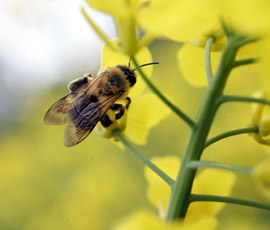Farm industry fights back over neonicotinoid ‘threat to bees’

Two key makers of neonicotinoid seed treatment compiled an action plan to help resolve the European Union stalemate over a potential ban due to their possible effect on bees.
Bayer CropScience and Syngenta are hoping its proposals will allay fears about the potential impact of insecticide products, like Modesto and Cruiser, on bee health.
A European Food Safety Authority (EFSA) report published in January suggested a potential link between the insecticides, used for controlling pests in oilseed rape crops, and declining bee populations.
Dr Rudiger Scheitza, head of strategy and business management at Bayer CropScience, says the plan aims to give consumers confidence in their products.
“A ban on neonicotinoids would simply close the door to understanding the problem and banning these products would not save a single hive.”
John Atkin, Syngenta’s chief operating officer
“Most of the evidence points to various parasites and diseases being the true cause of poor bee health,” he adds.
A European Commission proposal for a two-year ban of the insecticides failed in a Brussels vote after major nations such as Britain and Germany did not back the plan.
However, the controversy remains with many environmental groups continuing to lobby against the use of products such as Cruiser (thiamethoxam), Modesto (clothianidin) and Chinook (imidacloprid).
The agrochemical groups say yield losses in oilseed rape from pest like cabbage stem flea beetle and disease-carrying aphids would be significant if the products were banned, as over 90% of the UK oilseed rape crop is grown using a neonicotinoid seed treatment.
Key features of Bayer and Syngenta’s plan
- Scale up the creation of pollen rich, flowering field margins across the EU, to provide essential habitat and nutrition for bees.
- Support for the establishment of a comprehensive field-monitoring programme for bee health.
- Mandatory implementation of strict measures to mitigate the exposure risk to bees.
- Investment in, and implementation of, at the earliest opportunity, new technologies which further reduce dust emissions from the planting of seed treated with neonicotinoids.
- Further investment in the research and development of new solutions for the main factors impacting bee health, which include parasites and viruses, and establishment of area-wide, long-term pilot studies which demonstrate their effectiveness
John Atkin, Syngenta’s chief operating officer, believes the plan will give the wider industry and public better insight and understanding of bee health.
“A ban on neonicotinoids would simply close the door to understanding the problem and banning these products would not save a single hive,” he says
Earlier this week, DEFRA published a summary of research and concluded the risk to bee populations from neonicotinoids, as they are currently used, is low.
The ministry said on Wednesday while it could not rule out the possibility of these products affecting bees, further data based on realistic field trials was needed.
DEFRA’s Food and Environmental Research Agency (FERA) had the day before reported no consistent relationship between the use of theses agrochemicals and bumble bee numbers.
It said that its trial results were reassuring concerning bee health, but added that the trial did not constitute definitive proof.
The agrochemical industry body, the British Crop Production Council, agreed that more work was needed and called for a European Union-sponsored assessment based on field trials.
Pesticide combination may harm bees’ brains

